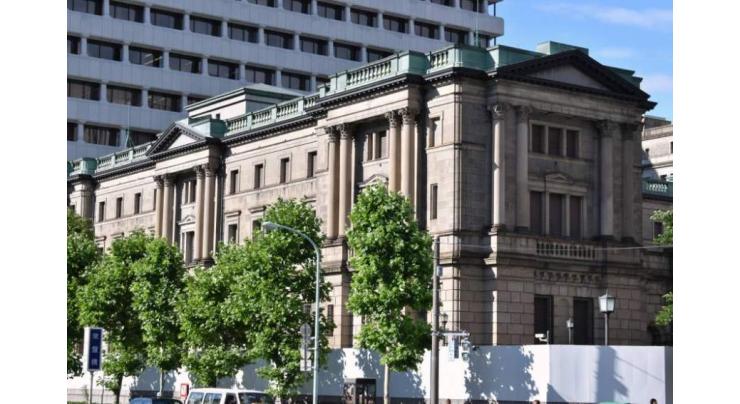
Bank Of Japan Lowers Inflation Forecasts Again
Faizan Hashmi Published January 23, 2019 | 04:46 PM

Japan's central bank again revised down its inflation forecasts on Wednesday, a further sign that authorities are losing the battle to boost prices in the world's third-largest economy
Tokyo, (UrduPoint / Pakistan Point News - 23rd Jan, 2019 ) :Japan's central bank again revised down its inflation forecasts on Wednesday, a further sign that authorities are losing the battle to boost prices in the world's third-largest economy.
After a two-day meeting, the Bank of Japan's policy board left its mammoth monetary easing programme in place, as expected, and lowered the inflation forecast for the fiscal year ending March next year to 0.9 percent from 1.4 percent.
BoJ Governor Haruhiko Kuroda said the decision to revise down the forecast was "due primarily to the decline in crude oil prices", but added it would only be temporary.
"It is true that it will take some time for us to achieve the two-percent target," he told reporters, referring to the bank's long-held goal.
"It is our belief that the most appropriate way is to patiently continue the existing monetary easing." The downward revision follows a previous downgrade in late October.
In 2013, the BoJ embarked on a huge bond-buying programme in a bid to stimulate long-dormant prices with the stated aim of hitting the two-percent mark within two years.
But while the plan -- which ran in tandem with Prime Minister Shinzo Abe's big-spending drive to ramp up the economy -- showed early promise, the bank has been forced to delay several times the date for hitting its target.
It has in the past blamed the "deflation mindset" of consumers and employers used to long periods of low growth and falling prices.
While the bank said Japan's economy will likely continue to expand, it added that "the mindset and behaviour based on the assumption that wages and prices will not increase easily have been deeply entrenched".
Officials have pointed to other factors, including cautious wage and price growth from firms, and increased technological progress that has reduced costs and intensified competition.
"It has been taking time to resolve these factors that have been delaying price rises," the bank said.
Recent Stories

PTI to stage nationwide protests against alleged electoral frauds

Senate continues discussion on Presidential address to Joint Sitting of Parliame ..

Masood Khan calls for Pak-US cooperation for regional peace

Interior Minister starts Margalla Trail Patrol for security

Currency Rate In Pakistan - Dollar, Euro, Pound, Riyal Rates On 26 April 2024

Today Gold Rate in Pakistan 26 April 2024

ICC Womens T20 World Cup Qualifier, Match 2: Ireland Women open with Comfortable ..

Robinson, bowlers help New Zealand go 2-1 up against Pakistan

Shahzeb Chachar to hold khuli kachehri on April 26

Heatwave amid Israel's aggression in Gaza brings new misery, disease risk

Tourism must change, mayor says as Venice launches entry fee

Court adjourns Judicial Complex attack case till May 17
More Stories From Business
-
Kitchen items’ prices ease as weekly inflation falls by 1.1%
1 hour ago -
Shipping Activity at Port Qasim
3 hours ago -
Machinery equipment assembling grew by 70.98% in 08 months
4 hours ago -
Gold rates up by Rs.2,500 per tola to Rs245,000
4 hours ago -
Miner Anglo American rejects BHP's $38.8 billion takeover bid
4 hours ago -
Exchange rates for currency notes
7 hours ago
-
Foreign exchange rates
7 hours ago -

Currency Rate In Pakistan - Dollar, Euro, Pound, Riyal Rates On 26 April 2024
8 hours ago -

Today Gold Rate in Pakistan 26 April 2024
8 hours ago -
Chinese minister felicitates Ahsan Iqbal on reappointment as Planning minister
17 hours ago -

Pak-US officials engage to enhance trade, investment ties
18 hours ago -

Stocks fall as tech shares sink, US economy slows
18 hours ago









